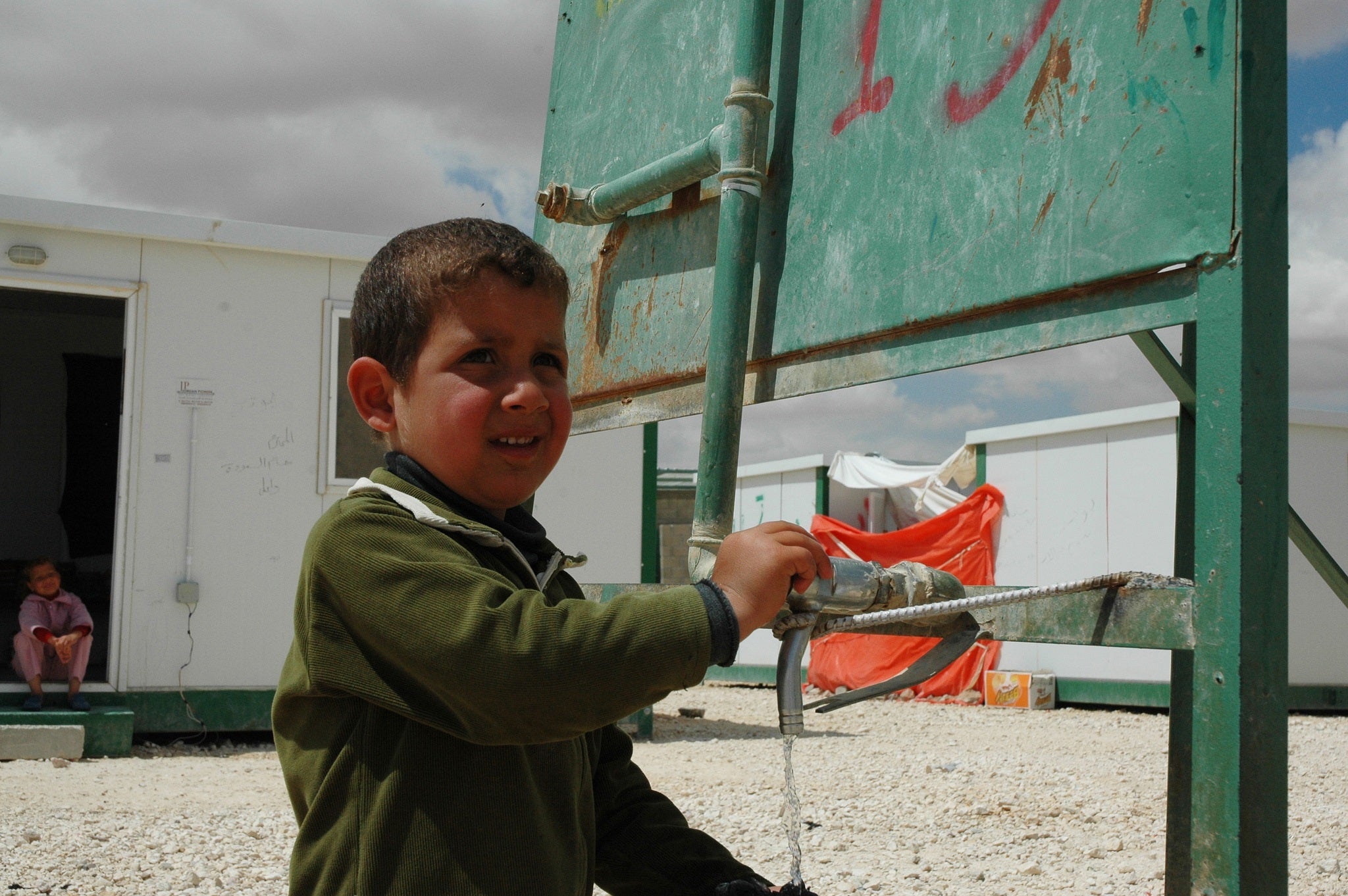
Photo: Oxfam International
Imagine that you must flee home at once. You may be fleeing violence, social tensions, poor environmental conditions, or even persecution. You and your loved ones may walk for several days to find safety, and may even go for periods without food.
What would you need to survive?
The answer is clean water. Finding drinkable water is one of the first steps in your journey to a new home. If you instead consume contaminated water, you risk exposure to several diseases. Drinking water unfit for consumption may not only harm your health in the short run -- drinking unclean water may cause life-long health problems. And of course, these problems multiply if entire communities, or even cities, face these health problems.
At the end of this leg of the journey, you may end up in a densely populated refugee camp. Many refugee camps quickly become quasi cities that suffer from poor planning, poor water supplies, and poor sanitation. Keeping these makeshift cities clean and safe is a herculean task. For many refugees and internally displaced persons (IDPs) in these water scarce cities, it is difficult to access water supply and sanitation facilities.
The situation is even more dire for refugees or IDPs in the water-scarce Mashreq subregion*. The demographic shock of mass migration compounds already complex challenges in the region -- from climate shocks to crumbling infrastructure. According to the World Bank report Turbulent Waters: Pursuing Water Security in Fragile Contexts, water security is more difficult to achieve in fragile contexts because of a range of factors, including weak institutions and information systems, strained human and financial resources, and degraded infrastructure.
Water Scarce Cities Initiative Hosts Technical Workshop to Tackle Tough Water Issues
The World Bank’s Water Scarce Cities Initiative (WSC) provides the unique opportunity for urban water practitioners, global thought leaders, and institutions to share solutions to such complex water security issues. Many urban centers are building resilience in their water systems to hedge against demographic and climate shocks, and there is much to learn from their experiences. By bringing together stakeholders with first hand experiences with water scarcity in urban contexts, WSC is bringing to light solutions and strategies for survival in a water scarce world.
- Read about the Water Scarce Cities Initiative in Marrakech and Orange County
Realizing the common global need to improve resilience to demographic shocks, particularly in fragile contexts, the World Bank’s Water Scarce Cities Initiative (WSC) hosted the Second Technical Workshop in Beirut, Lebanon. This workshop gave diverse participants – such as youth and women – the opportunity to learn from one another about principles and successful applications of Integrated Urban Water Management (IUWM) in fragile and water scarce environments. The workshop included presentations such as the Malta water security experience and a panel discussion on Urban Water Management Challenges and Approaches. The workshop findings highlight that robust water management systems should be a priority in fragile contexts, and that pursuing water security in fragile contexts requires cross-sectoral approaches to reduce the risks of fragility. It is critical to preserve surface, ground- and transboundary water resources through water-related investments aimed at reversing the water insecurity and fragility cycle. These solutions may include regulating and monitoring groundwater abstraction, as well as rehabilitating/developing water storage infrastructure using labor intensive methods.
- Read this WSC story to find out what Malta, Marrakech, and Las Vegas have in common
Emily Lewis, Livelihoods Technical Coordinator, Danish Refugee Council (Dansk Flygtningehjælp), contributed to the workshop discussions. She designs and manages the implementation of livelihood interventions for Syrian refugees and Jordanians, as well as leads several coordination groups in the region. Ms. Lewis reflected on her experience with the workshop, as well as with the dynamics between water insecurity and fragility:
“You have systems that are undergoing significant shocks constantly…so you really need an integrated approach because the system alone or these technical areas alone can’t handle the stress from each of these shocks…Trying to bring in the support from the local governments, from the INGO sector, or from the private sector, bringing these voices to the table will help significantly in hedging the risk of investing in water management strategies in fragile states.”
- Watch workshop interviews, view presentations, and the full agenda, all available on the Water Scarce Cities events and engagement page.
Water Scarce Cities Initiative Continues to Chart New Paths to Water Security
Through events such as the Second Technical Workshop in Beirut, WSC aims to shift the mindsets of water managers, demystify available water scarcity solutions, and offer true and tested pathways to water security. The Water Scarce Cities Initiative offers a new avenue for knowledge sharing on urban water management by creating and sustaining stronger connections between cities facing water scarcity – as evidenced by the constructive convening of diverse voices at the workshop in Beirut.
There is still more we can do to improve urban water security in fragile contexts. Refugee and IDP numbers continue to increase worldwide, while pressure is mounting on finite water resources. Many world regions are increasingly water-strapped, and this can worsen fragility, or even contribute to perpetuating cycles of conflict. Water insecurity can weaken the social compact between a government and its people, adding to a downward spiral of water insecurity and fragility.
The WSC is a work in progress and aims to continue strengthening cooperation between cities and utilities to improve management of scarce water resources. By sharing strategies for survival in a water scarce world, WSC casts new light on how urban areas in scarcity contexts can thrive in a finite resource world.
* The Mashreq subregion includes five countries: Iran, Iraq, Jordan, Lebanon, Syria



Join the Conversation